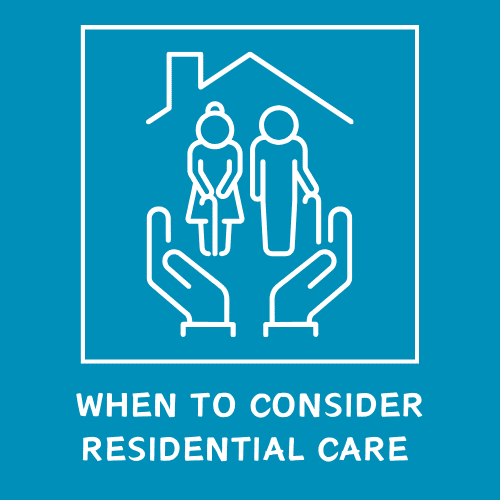When is it time to consider residential care
Tuesday December 24, 2024

Residential memory care is not an option that many families want to consider. Caregivers often feel the obligation to care for their loved one with memory impairment at home and feel so much guilt about considering residential care. Choosing residential care for a loved one does not make you a bad caregiver or a bad family member. It certainly does not mean you don’t love your person. It simply means you need some help to provide the level of care that is now appropriate for your loved one. It means you want the best care possible for your loved one and sometimes this means they may have to live outside the home.
When should I consider residential care?
Often, caregivers ask me, “When should I look into residential care?”
My answer is, “If you are thinking about it, then the answer is you should do it NOW.”
Caregiving is exhausting and tasks tend to get pushed off. Suddenly, you find yourself urgently needing residential care. By then, you’re exhausted and overwhelmed when you have to do the legwork to find a suitable place. Making a thoughtful decision in that state can be difficult. So, I encourage people to look into residential care sooner than later.
Consider residential care early on as a back-up plan
You may plan to provide care at home for your loved one until the end, but what happens if something happens to you? What if you have a bad car wreck and aren’t able to provide care for your loved one? What happens if you, as the caregiver, have a heart attack and die? No, these are not pleasant to think about, but it’s important to consider the plan for your loved one if something happens to you.
Maybe your adult child is not able or willing to provide the day-to-day care in their own home. Maybe you are the adult child who is caregiving and there is no other family – what would the back-up plan be?
Having residential care as a back-up plan does not mean that you ever have to implement that plan, but it means you have a safety net. If something were to happen to you, as the primary caregiver, you have already done the legwork of checking places out and making decisions about what you would want care to look like for your loved one.
Consider residential care before you reach your limit as a caregiver
Nearly every caregiver has a personal limit of when they cannot continue to provide care at home, and it varies from person to person. For some, it may be when their loved one becomes incontinent. For others, it may be if their loved one ever gets aggressive. It could be if their loved one is up all night long, keeping them awake and they can’t get the sleep they need. For others it may be something else completely. No matter what your limit is as a caregiver, it is important to consider residential care BEFORE you reach your limit.
Consider residential care when safety is an issue
It may get to the point that your loved one isn’t safe in the home anymore. They may be wandering out of the house (and lets’ face it – you may have to go to the restroom at some point and not be able to guard the door). It could be that they are trying to cook or getting into things that are not safe. While there are various safety measures you can take, there comes a time when it just isn’t safe at home anymore.
Consider residential care when you are experiencing major life changes
When major changes are occurring in your life, it may be a good time to consider residential care. That may be when you are caring for your parent and you are expecting a baby Or perhaps you are facing job changes and will be traveling more or at the office longer hours.
If your loved one had cancer, would you be the one to administer their chemotherapy or radiation? Would you decide the frequency of those things or the dosage? No, of course not, because you are not qualified. You didn’t study how to do that.
The same can be true for caregiving for someone with memory impairment. You did not receive extensive training, and this is not your specialty. The professionals within residential communities do have the proper training and it is their specialty. It is OK to move your loved one into a residential community.
Of course, there will be a period of adjustment for you and your loved one. Often, once the individual has adjusted to the new environment, when you go to visit, you get to have a pleasant visit and get some of the relationship back. Once your loved one is settled into residential care, you no longer have to be the task master of all the day-to-day things (take your meds, get a shower, put on your shoes, eat your breakfast, put that away, let’s go). Instead, you get to be the loving daughter/son/spouse who comes to visit and brings ice cream. The move into residential care can be just as good for the individual with memory impairment as it is for the caregiver.
If you are considering residential care and have any questions, please reach out to our Program Director Sheri Wammack at [email protected] or call 901-854-1200.
Additional blogs to check out:
https://pagerobbins.org/care-share/transitioning-to-memory-care/
https://pagerobbins.org/care-share/backup-plans/
WRITTEN BY SHERI WAMMACK, LBSW




